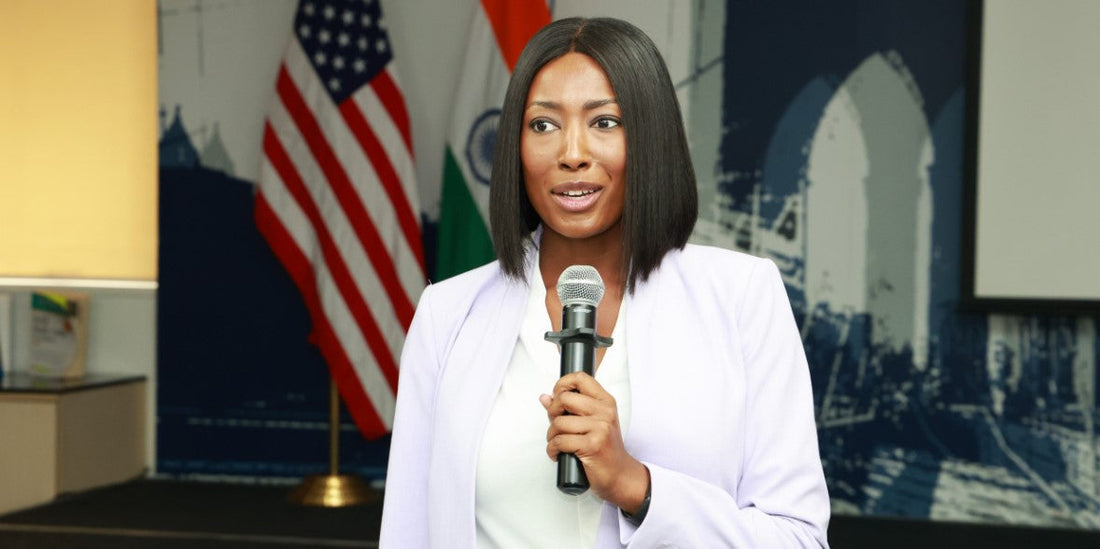
Reaching for the Stars
Share
Aisha Bowe’s work in STEM education and tech entrepreneurship inspires future generations—including young innovators in India—and strengthens America’s innovation, global leadership, and U.S.-India connections and partnerships.
For aerospace engineer Aisha Bowe, the phrase “the sky is the limit” doesn’t apply—why stop at the sky when you can aim for the stars?
Bowe started her academic journey at a community college and went on to earn degrees in aerospace and space systems engineering. She is the founder and CEO of STEMBoard , a technology company, and LINGO , an educational tech company. Bowe is an expert in strategic technologies as well as STEM (science, technology, engineering and math) education. Bowe’s work in STEM education and technology entrepreneurship helps equip the next generation with critical skills, strengthening America’s innovation economy.
Confirmed to fly with Blue Origin on New Shepard , she is set to become the seventh African American woman to cross the Kármán line, the internationally recognized boundary of space. Bowe visited Chennai, Delhi, Kolkata and Mumbai in 2024 as part of the U.S. State Department’s speaker program , connecting with students and professionals to share her journey and passion for STEM. Her achievements in aerospace and outreach efforts highlighted U.S. leadership in space exploration and technological advancement, reinforcing the nation’s global competitiveness and security.
Excerpts from an interview.
Can you elaborate on the genesis of STEMBoard and LINGO? What inspired you to start these companies?
I founded my companies to address the challenges I encountered growing up. The motivation for STEMBoard came from my experience of not initially recognizing my aptitude for STEM fields.
One of the biggest challenges I see is the pressure to choose a career path before truly understanding yourself or being exposed to the vast opportunities the world has to offer. I wanted to live a life that defied those expectations. With persistence, I earned an undergraduate degree in aerospace engineering, pursued a master’s in space systems engineering, and achieved my dream of working at NASA (National Aeronautics and Space Administration). Each step—from founding STEMBoard to launching another company—once seemed out of reach, until I chose to pursue it.
What are the most exciting technologies currently, and how do you see them shaping the future?
When I founded STEMBoard 11 years ago, it was an engineering company centered on emerging technologies like data science, data analytics and generative AI (artificial intelligence). These fields are shaping industries, yet they remain out of reach for many—especially middle and high school students.
Recognizing this gap between industry competency and available education, we set out to make these technologies accessible to learners everywhere, regardless of their school resources. That vision became the foundation of LINGO, a business built on self-paced kits covering topics like data science, analytics and AI. As society becomes increasingly digitized, these skills will play a critical role in leveling the playing field.
What are you most excited about regarding your upcoming trip to space? How do you think commercial space travel will evolve in the coming years?
I’m truly excited about inspiring people who see this and think, “I want to be part of this too!” —whether by innovating, developing new technologies, or even becoming the first person on Mars.
Commercial spaceflight is evolving in remarkable ways. We’ve progressed from simply crossing the Kármán line to missions like NASA’s SpaceX commercial crew program , which now sends humans into orbit and to the International Space Station.
These advancements aren’t just about reaching new frontiers; they’re about developing the technologies essential for human survival in some of the most inhospitable environments in the universe. Innovations like growing plants in space will have far-reaching, transformative applications.
How do you see U.S.-India collaborations in STEM evolving in the coming years?
There is tremendous potential. The contributions of Indian leaders to the global tech landscape are remarkable, with many respected Indian CEOs at the helm of major U.S. tech companies.
India is also home to leading research institutions driving advancements in fields like quantum computing and AI. When India and the United States come together to collaborate, the possibilities are truly limitless. The synergy between their expertise, innovation and shared vision creates an environment where groundbreaking progress is not only possible—it’s inevitable.
What advice would you give aspiring entrepreneurs in the STEM fields?
We are at a unique point in history where digital solutions provide unprecedented access to the global economy. This creates incredible opportunities for aspiring entrepreneurs.
My focus is on empowering people to start small and grow bigger. The company I founded 11 years ago was actually the third business I attempted. I view entrepreneurship as a skill—one that grows with practice. The more you exercise it, the more proficient and confident you become as a business leader. The goal isn’t immediate success, but simply starting. Over time, you’ll gain the experiences necessary to achieve the success you aspire to.
